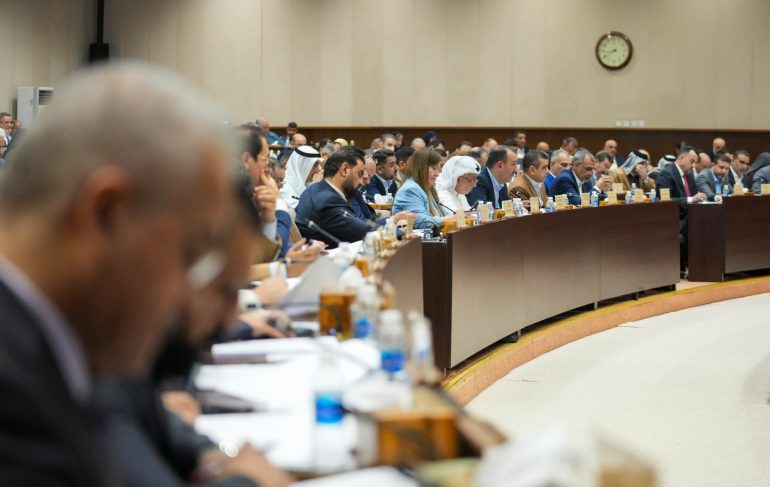Iraq’s parliament on Monday approved a massive budget that boosts public spending in the country and grants the federal government the upper hand over oil exports from the autonomous Kurdistan region.
The 198.9 trillion dinar ($153 billion) budget — valid for three years though subject to future amendments — also sets out record spending on public wages, investments and development projects.
Lawmakers approved the bill after days of voting and months of wrangling over its articles in a country long accustomed to budget delays. Most contentious parts of the bill were related to the Kurdistan Region’s share of the budget and its control over its oil sector.
The new bill allocates 12.67 percent of the budget to the Kurdistan Region in return for handing over of at least 400,000 barrels of oil per day to the Iraqi state marketer SOMO, with revenues going to a central bank account overseen by Baghdad.
Approval of articles 13 and 14, pertaining to the Kurdistan Region, followed intense eleventh-hour talks between Iraqi and Kurdish political parties. Kurdish leaders had previously denounced amendments relating to oil in the budget, resulting in repeated delays to the vote. However, the final cause of tension emerged from disputes among the Kurdish political parties themselves.
In March, international arbitrators affirmed Baghdad’s exclusive right to manage Iraqi crude exports via Turkey, resulting in a suspension of oil exports from the Kurdistan Region. Subsequently, a deal was struck between Baghdad and Erbil. This deal signaled a paradigm shift in the Kurdistan Regional Government (KRG)’s approach to its hydrocarbon sector, which had been autonomously producing and exporting oil for nearly a decade.
For years, the KRG amassed billions in revenue by exporting oil to Turkey without the approval of the Iraqi federal government, leading to persistent disputes between Erbil and Baghdad. With the budget now passed, the KRG must allow the State Organization for Marketing of Oil (SOMO) to assume control of exports and sales, gaining access to oil contracts, shipments, and other aspects of the oil production process. Both the KRG and International Oil Companies (IOCs) are mandated to provide monthly summaries of oil-related operations.
Erbil seemingly conceded defeat, finally relinquishing its long-held ambition to consolidate control over its hydrocarbon sector. However, this is not the end of the story, as fissures appeared between the Kurdish factions in Baghdad during the four-day voting process. Tensions peaked on Saturday when the Patriotic Union of Kurdistan (PUK) succeeded in challenging its rival, the Kurdistan Democratic Party (KDP), by passing a contentious clause.
Clause 8 of Article 14 empowers provinces within the KRG to directly receive funds from the Iraqi central government in case of a dispute with the KRG. The allocation of such funds, however, is contingent upon the approval of the Iraqi Prime Minister. The passage of this clause rekindled tensions, with KDP leaders and officials issuing strong statements accusing the PUK of betrayal.
The PUK, on the other hand, hailed this as a victory, extending “congratulations” to the residents of Sulaymaniyah and Halabja provinces. They claimed that these provinces would no longer have to endure “injustices”. The PUK has consistently accused the KDP-led KRG of withholding funds from PUK-controlled provinces, asserting that this clause could help put an end to such “discrimination”.
The resurgence of tensions between the KDP and PUK, following previous disputes over regional elections and security matters, stands to further complicate internal affairs, potentially leading to additional delays in the November polls.
Other concerns have also surfaced, as Iraq has been warned that it teeters on the brink of a financial “intensive care” situation unless it broadens its revenue sources beyond oil. The budget, which carries a record deficit of approximately 64.36 trillion dinars, encompasses the addition of over half a million new public sector employees. Total revenues are projected at $103.4 billion, based on a three-year forecast of oil prices at $70 per barrel, with oil making up 90 percent of income. Should oil prices drop, Iraq could face significant challenges.
Iraq has been previously warned to wean itself off its overdependence on oil. The International Monetary Fund said last month that “a significantly tighter fiscal policy is needed to strengthen resilience and reduce the government’s dependence on oil revenues while safeguarding critical social spending needs”.
The new budget also sets aside $37.9 billion for investments, with Prime Minister Mohammed Shia al-Sudani noting that his “priority” is to develop infrastructure in a country where basic services have long been sorely lacking.
The oil-rich country has long been wracked by rampant corruption even as it struggles to emerge from decades of war that ravaged its infrastructure.
NRT English, AFP


